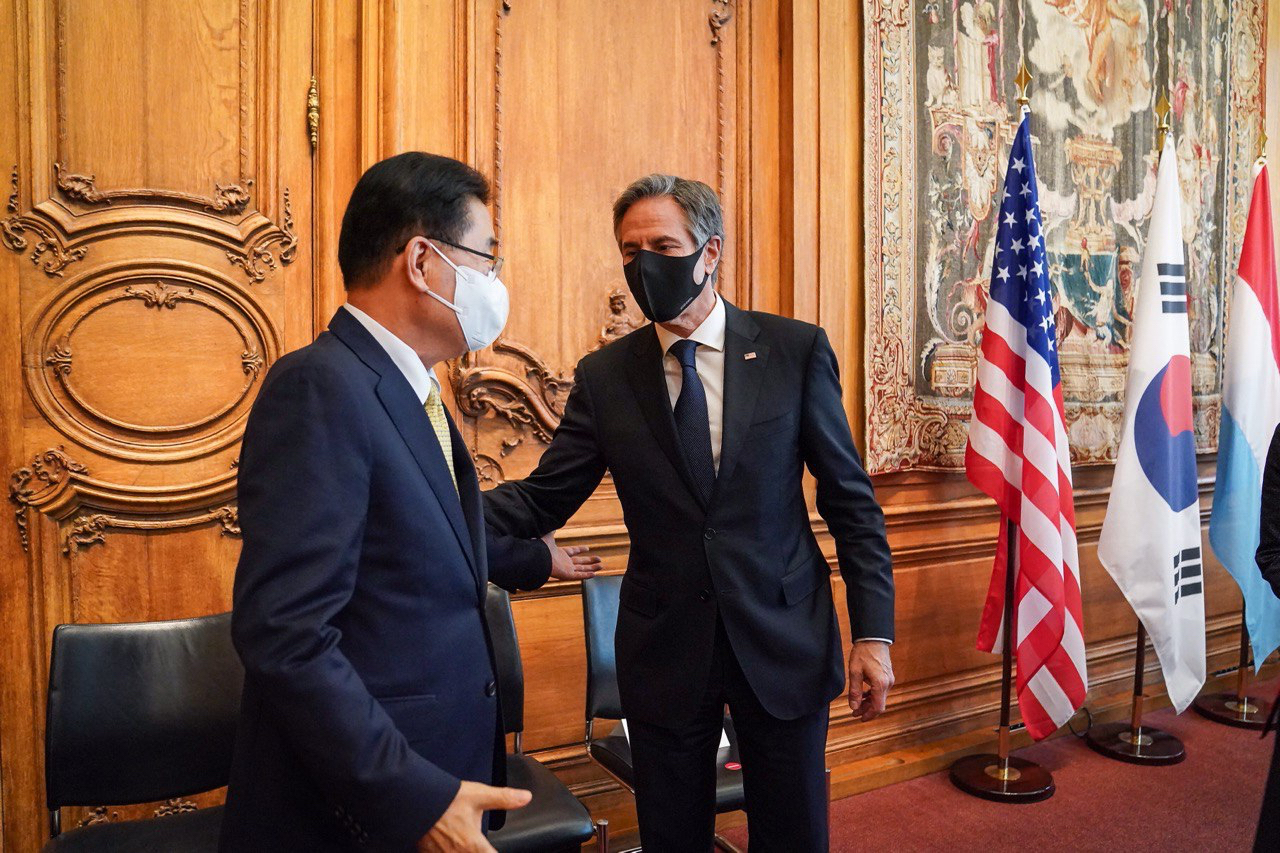 |
Foreign Minister Chung Eui-yong (left) and his US counterpart, Antony Blinken, meet for a brief session on the sidelines of the Meeting of the OECD Council at Ministerial Level in Paris on Tuesday. (Ministry of Foreign Affairs) |
South Korean Foreign Minister Chung Eui-yong stressed the need to declare an official end to the Korean War in his talks with US Secretary of State Antony Blinken, amid recent signs of potential discrepancies between Seoul and Washington in their approaches to Pyongyang.
The two envoys held a pull-aside meeting Tuesday on the margins of a meeting of the Organization for Economic Cooperation and Development in Paris.
Chung told Blinken that President Moon Jae-in’s recent proposal to declare an end to the 1950-53 Korean War would be a “meaningful” confidence-building measure to engage the recalcitrant regime. The two agreed to closely communicate on the matter, according to the Foreign Ministry.
They also assessed the recent situation on the Korean Peninsula and exchanged views on ways to resume talks with North Korea, which have been stalled for more than two years.
Chung and Blinken met at a time of mixed signals from the North, with conciliatory gestures alternating with provocation. On Monday, communication between the two Koreas was restored about two months after Pyongyang unilaterally cut off contact in August. Moreover, Pyongyang conducted a flurry of missile tests last month -- firing a new cruise missile, a hypersonic missile and two ballistic missiles -- in defiance of UN Security Council resolutions banning the North from developing or testing nuclear weapons or ballistic missiles.
With just seven months left in his tenure, President Moon and his government have been engaged in a last-ditch attempt to put the peace process back on track, even as Pyongyang upped the ante with missile launches. At the United Nations General Assembly last month, Moon again proposed declaring a formal end to the Korean War -- which concluded with a cease-fire rather than a peace treaty -- as a first step toward denuclearization and peace.
South Korea has been pushing the US to do more. In an interview with the Washington Post last week, Foreign Minister Chung called on the Biden administration to spell out the specific incentives it would offer Pyongyang at the negotiating table. In response, a senior US official was quoted as saying the US had put forward specific proposals for discussion with the North but Pyongyang had not responded.
The minister also addressed a parliamentary session last week and mentioned the need to ease sanctions on North Korea as a way to draw the regime back to the nuclear talks.
The US State Department seemed to disagree with Chung and issued a statement stressing the need to maintain sanctions against North Korea.
“It is important for the international community to send a strong, unified message that the DPRK must halt provocations, abide by its obligations under UN Security Council resolutions and engage in sustained and intensive negotiations with the United States,” a State Department spokesperson told the Voice of America.
Meanwhile, in Paris, Chung also held talks with his Italian counterpart, Luigi Di Maio. The two envoys agreed to expand bilateral cooperation in “future-oriented” sectors such as green industries, according to the ministry.
He also met Croatian Foreign Minister Gordan Grlic Radman and discussed bilateral relations and issues on the Korean Peninsula. With the next year marking the 30th anniversary of the establishment of bilateral ties between Croatia and South Korea, the two agreed to work together to deepen relations through high-level exchanges.
On Tuesday, Chung delivered a keynote speech at the OECD ministerial session highlighting global efforts to tackle the COVID-19 pandemic. Chung stressed the need to open country borders to facilitate the exchange of genetic information and distribute vaccines and treatments.
He also said Seoul would keep its earlier pledge to donate $200 million to the COVAX facility in the interest of achieving a swift vaccine supply.
By Ahn Sung-mi (
sahn@heraldcorp.com)








